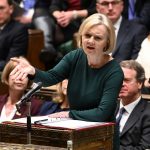Primark has said it won’t further raise prices despite significant costs as it announced a return to pre-COVID-19 sales and market share in the UK.
Commenting on Primark‘s full-year results, the chief executive of its parent company, Associated British Foods, said: “We have decided to hold prices for the new financial year at the levels already implemented and planned and to stand by our customers, rather than set pricing against these highly volatile input costs and exchange rates.”
George Weston, said Primark has faced “significant input cost inflation and sharply moving currency exchange rates”.
Despite that, it reported that like-for-like sales and market share in the UK are now broadly in line with pre-COVID levels.
The fast fashion retailer experienced a “significant” increase in customer footfall as markets emerged from the pandemic, Associated British Foods said.
Total sales were up 43% to £7.7bn, compared to last year, though sales were weaker in continental Europe due to cautious customer sentiment.
Mr Weston credited the significant increase in sales, margin and profits at Primark with the return of “normal customer behaviour”.
Primark plots price hikes as sales rise 59% in first half of financial year
Primark gets new website – but will not allow customers to buy clothes online
Primark to cut hundreds of jobs in store management shake-up
He highlighted plans to build the retailer’s digital capability by trialling an online click and collect in store service in 25 UK shops, “which will be a key element in the future development of Primark”.
For the first time in its history, the parent company, Associated British Foods, announced it was going to buy back £500m worth of shares from shareholders. Shareholders are also going to get a payout increase of 8%.
The parent company owns a range of household brands such as Kingsmill, Twinings, Patak’s and Ryvita and said there was a “robust” delivery in food with retail performance strongly ahead.
Food sales grew 10% on the previous year.
The profit increases won’t last forever, and group profits and adjusted earnings per share will be lower next year than this year, Mr Weston said.






















